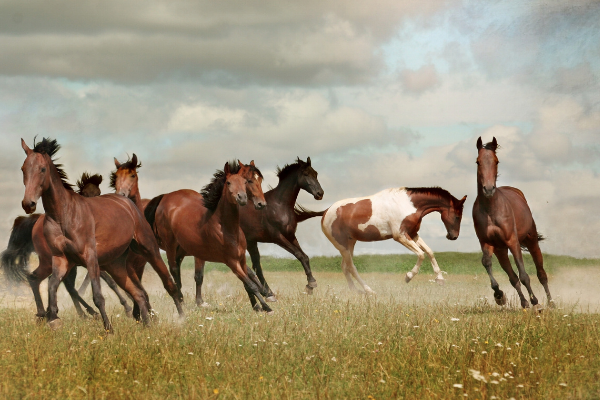Friends of Animals has submitted a rulemaking petition to new Bureau of Land Management Director Tracy Stone-Manning to halt wild horse roundups and convene an independent panel of scientists to overhaul the agency’s controversial Wild Horse and Burro Program rules and policies. FoA wants the BLM to include the impact of cattle and sheep ranching on public land range assessments, and immediately reduce the number of cattle and sheep within wild horse herd management areas when any wild horse management is planned because of range deterioration, followed by a phaseout of all livestock as grazing permits expire.
“It is time to take a rigorous look at the massive presence of cattle and sheep grazing within herd management areas as a significant cause of habitat degradation,” said Michael Harris, director of Friends of Animals Wildlife Law Program. “According to BLM, there are approximately 79,568 wild horses residing in herd management areas. In those HMAs, there are roughly 669 grazing allotments partially or entirely in those boundaries, which house more than 4 million livestock, yet BLM has set meager numbers—appropriate management levels—for how many of America’s beloved wild horses can exist in balance with other rangeland species and resources.”
Stone-Manning, the former public lands expert with the National Wildlife Federation, was appointed BLM director in September, and has yet to be forthcoming about her views of wild horse protections. Under the Biden administration, roundups have been prioritized. If the BLM denies the petition, FoA will likely take the agency to court.
The rulemaking petition points out that roundup decisions are being made based on speculative, unscientifically sound information pertaining to wild horse populations and range conditions. As the National Academy of Sciences reported in 2013, BLM’s wild horse and burro program lacks regular, consistent use of scientifically rigorous methodologies to estimate population sizes, to model effects of management actions on the animals or to assess the availability and use of forage on rangelands.
“Earlier this year, in objecting to removal of wild horses from Colorado’s Sand Wash Basin herd management area, Governor Jared Polis reflected the very same concerns, noting that many experts disagree with BLM’s assessment of the wild horse populations and range conditions, and that more solid, science-based study of wild horse herds is necessary,” Harris said. “The problem, in a nutshell, is that decisions are often based on field office-level observations that lack scientific analysis that can be evaluated by range management experts.”
FoA is asking that BLM utilize a rigorous, science-based, systemic range assessment tool to estimate wild horse and burro populations and to evaluate the current and future availability of forage on HMAs and herd areas, which are where wild horses existed at the time of the passage of the Wild and Free-Roaming Horses and Burros Act of 1971 but are no longer present.
FoA also wants the agency to reevaluate the use of those HAs to support wild horses and reconsider all appropriate management levels every three years.
“If implemented, FoA’s proposal would restore protections intended by Congress, and would likely dramatically reduce, if not end, wild horse roundups. That means herds are kept intact, respected and cherished,” Harris said.

